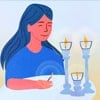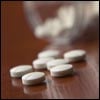One of the first tasks you learn as a soldier is how to shine your boots. No matter where you're stationed or what your mission, your day begins with polished boots.
When my men and I arrived at Ground Zero, fires were raging out of control and the smoke was burning our eyes. The first thing I noticed was the ash. Cars, people, buildings — everything was covered in ankle-deep ash. Some time later it occurred to us that many people who had been inside the World Trade Center had been completely burned, cremated by the intense heat of the explosions and fires. This ash was their remains.
I did not clean my boots that night. How could I? Would it make a difference? Within four hours I would be back outside, amid the carnage and destruction. I have not shined my boots since September 11, and when my mission here is completed and I am no longer needed at Ground Zero, these boots will be buried, never to be worn again.
The question I hear every day, from soldiers, civilians, politicians and rescue workers is, "How could G‑d allow this to happen?" They ask me this as I walk on the ashes, as I climb over destroyed buildings, and as I pass the constant stream of families in mourning, peering over the barricades. I could tell them that there are people who choose to do good and people who choose to do evil. But what do I say to the thousands of innocent people who are suffering, the victims and the bereaved? What can I offer? I can only try to offer hope.
Essentially, my job is hope. I am not trained in desert warfare, I cannot fly an F-16, and I get stuck sometimes just trying to send e-mail. But I do know the value that Judaism places on hope and faith. The Talmud teaches us that even if the blade of an enemy's sword is at one's throat, one must never give up hope.
Inside every person there is an incredible reservoir of hope and strength. I have seen it in our Armed Forces for 26 years. But September 11th exposed this hope in each and every person.
I saw hope in a firefighter who stood on burning debris with his boots melting, hoping to find survivors. I saw hope in the eyes of a rescue worker who pulled a yarmulke out of the wreckage and gave it to me, hoping that I could find out to whom it belonged.
I saw hope in a volunteer who heard that I was going to blow the shofar at Ground Zero on Rosh Hashanah. When she heard the notes of the shofar, tears began to stream down her face. When the service was over, she gathered herself together, took a deep breath and went back to work.
I saw hope and strength in the Army combat engineers who built a sukkah at Ground Zero for rescue workers and families of the Jewish faith. I heard hope in the words of President Bush and Governor Pataki. I saw hope in the actions of Mayor Giuliani, who was constantly with the workers, encouraging them and thanking them for their help. These ordinary people, these rescue workers, these leaders, help give us hope and faith in a time when we need it most.
A grandfather was talking to his grandson about how he felt. He said, "I feel as if I have two wolves fighting in my heart. One wolf is full of anger, despair and hopelessness. The other is full of compassion, strength and hope."
The grandson asked, "Which wolf will win this fight in your heart?"
The grandfather answered, "The one that I feed."
If there is one thing we need most today, it is hope. Feed the hope and faith in yourself and others around you. Never give up. Never lose hope, as it is the essential ingredient with which we will rebuild our society. Without it, we have buildings that can be destroyed. With it, we are one nation under G‑d, indivisible.







Start a Discussion